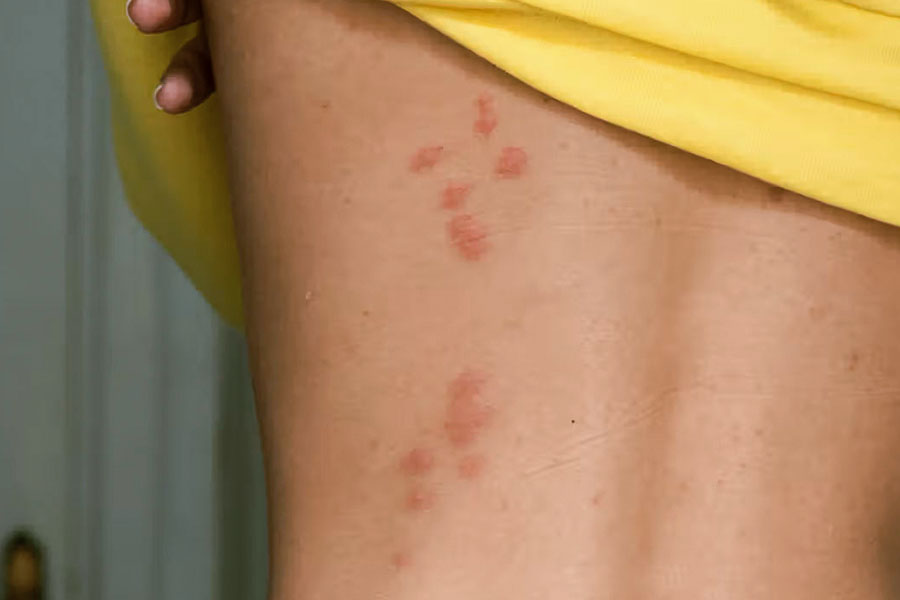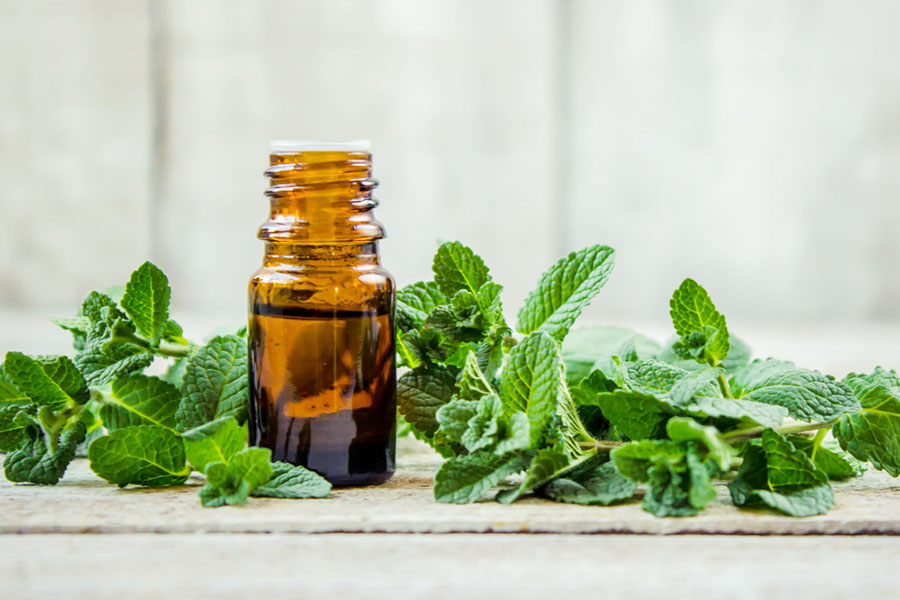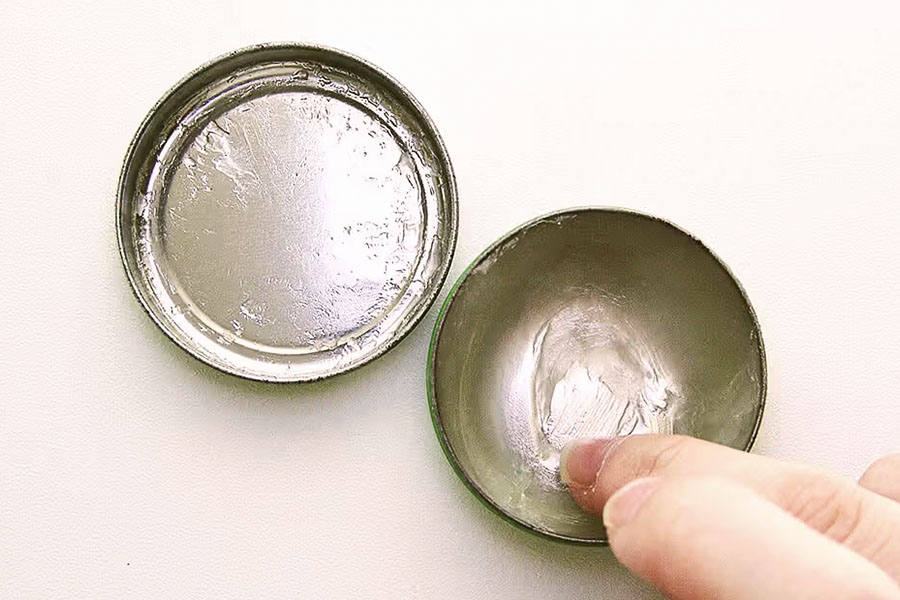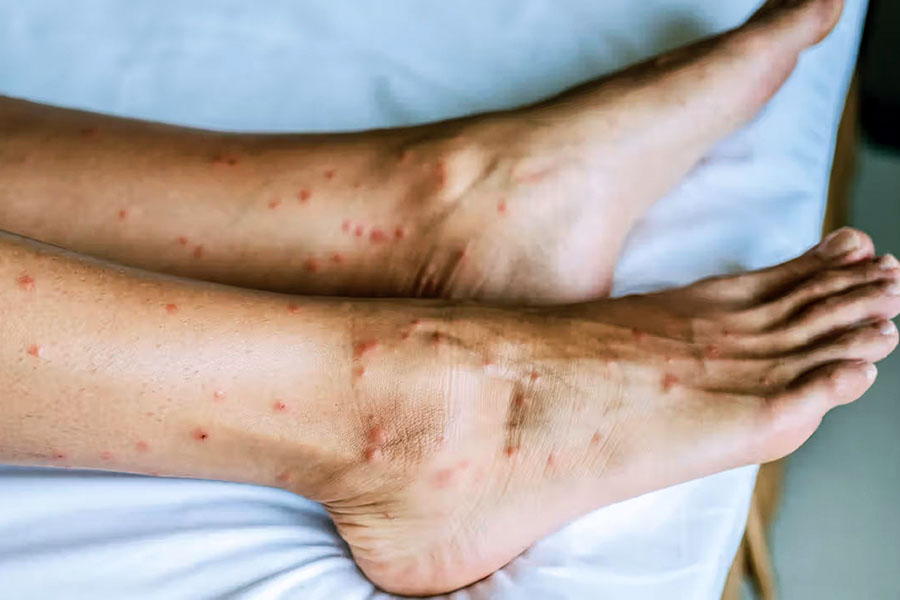Bed bug bites can be incredibly frustrating and uncomfortable. These pesky insects often leave behind itchy, red welts lasting for days or weeks. While getting rid of a bed bug infestation is crucial, protecting yourself from their bites is also important. So, what can I put on my skin to prevent bed bug bites?
In this article, we’ll explore various topical options that claim to provide a barrier against bed bugs. From essential oils to specialized repellent creams, we’ll dive into their effectiveness and safety considerations.
We’ll also discuss alternative methods for minimizing your risk of bed bug encounters because, sometimes, the best defense is a multi-pronged approach. If you’re tired of waking up with those telltale bite marks, keep reading to discover potential solutions!

Source: medicalnewstoday.com
What Can I Put On My Skin to Prevent Bed Bug Bites?
You might apply several creams or substances directly to your skin to prevent bed bug bites. Natural repellents like lavender or tea tree oil are effective in deterring bed bugs when applied topically.
These essential oils have properties that bed bugs find unpleasant, potentially reducing the likelihood of bites. Additionally, over-the-counter insect repellents containing DEET or picaridin might provide relief for some people.
It is crucial to follow the instructions on these products carefully to ensure effectiveness and avoid potential skin irritation. Remember that individual reactions may vary, so we advise you to test a small amount on a skin patch before widespread use.
Importance of Preventing Bed Bug Bites
Effects of bed bug bites on health
Bed bug bites might greatly affect both physical and mental health. Physically, they may often cause intense itching, irritation, and skin inflammation. Excessive scratching might worsen the irritation and, in severe cases, lead to infection.
Besides the physical discomfort, bed bug bites might also have a psychological impact. Constant itching, visible welts, and disrupted sleep due to bites might lower self-confidence and disrupt daily life.
Sometimes, bed bug bites may trigger allergic reactions, leading to severe swelling and difficulty breathing. Anaphylaxis, although rare, might occur and require immediate medical attention.
The importance of preventive measures
Given the numerous negative impacts of bed bug bites, it is crucial to take proactive measures to prevent them. This begins with avoiding bed bug infestations through regular inspections and immediate treatment upon detecting any signs.
Early intervention might halt their spread before the situation worsens. Despite prevention efforts, some bites may still occur, making protective measures crucial.
Moreover, using bed bug-proof encasements and exploring safe repellents might provide added protection. Implementing these strategies offers peace of mind and ensures a restful sleep free from the annoyance of waking up covered in bites, reclaiming your living space from these pests.
Topical Applications to Prevent Bed Bug Bites
Peppermint leaves and oil
Peppermint, a fragrant herb with menthol compounds, is thought to repel insects like bed bugs. You can make a homemade repellent spray using concentrated peppermint oil.
To make it, you should mix peppermint leaves or oil with water and spray it on the skin, bedding, and places where bed bugs might hide. Reapply regularly as the scent fades.
Although generally safe, some people may get skin irritation from peppermint. Also, its repellent effect is temporary and may not always work.

Black walnut tea
Black walnuts have natural compounds called tannins that may deter insects such as bed bugs. People often make homemade repellent using black walnut tea. You can steep black walnut shells or leaves in boiling water, let the substance cool, then apply it topically or use it to wipe down surfaces.
However, evidence supporting its effectiveness against bed bugs is mainly anecdotal and varies in results. It typically requires frequent reapplication and should be used alongside other proven methods.
Petroleum jelly
Petroleum jelly creates a slick, waterproof barrier on the skin that may prevent bed bugs from being able to bite. As an affordable and readily available option, a thin layer can be applied to exposed skin areas and reapplied as needed, especially after washing.
Yet, be careful when you apply it around your eyes and sensitive areas. While petroleum jelly doesn’t directly repel or kill bed bugs, it might aim to prevent bites on treated areas, though bed bugs can still crawl on treated skin.

Rubbing alcohol
Many believe using high-proof rubbing alcohol might keep bed bugs away due to its strong smell. However, whether it truly works remains a subject of debate.
To try it out, simply apply rubbing alcohol onto your skin by dabbing or spraying it, but remember to do it often since it evaporates fast. Be careful to steer clear of sensitive areas like your eyes and nose.
Despite its potential, rubbing alcohol has its downsides. Its quick evaporation means its effects don’t last long, and using it too much might dry out your skin. Due to these limitations, it’s not seen as a dependable solution to tackle bed bugs independently.
Diatomaceous earth
Diatomaceous earth is a naturally occurring sedimentary rock made from the fossilized remains of tiny aquatic organisms. It works as an insecticide by causing abrasions and dehydration in insects. To use, lightly dust diatomaceous earth onto areas prone to bed bug activity, avoiding inhalation.
Reapply after cleaning or when the powder is disturbed. Studies show diatomaceous earth might kill bed bugs on contact. However, it may not prevent bites if not applied thoroughly, so it works best when combined with other prevention methods.
Natural Remedies for Bed Bug Bites
Can I put something on my skin to prevent bed bug bites naturally? Natural methods such as essential oil use, vacuuming, and heat treatment might deter bed bugs and help maintain a bug-free environment. When diluted and sprayed, essential oils like lavender or tea tree oil act as repellents but require frequent reapplication.
Laundering fabrics on high heat is another effective method for killing bed bugs. Additionally, using a hot iron might provide heat treatment.
Natural remedies might be safer than chemical repellents as they avoid harsh chemicals linked to health concerns. Moreover, they have a lower environmental impact and biodegrade more readily than synthetic pesticides.
Natural remedies are often cost-effective as they utilize common household items as deterrents. However, in cases of severe infestations, we suggest you seek professional extermination services.
Allergic Reactions to Bed Bug Bites
Bed bug bites typically cause mild, itchy red welts for most people. Nonetheless, some may experience more severe allergic reactions. Moderate symptoms include swelling, rashes, blisters, hives, and sometimes wheezing.
As mentioned, bites might sometimes lead to life-threatening anaphylaxis, marked by difficulty breathing, dizziness, and loss of consciousness. Those with known insect allergies or experiencing more than mild reactions should closely watch for allergic symptoms.
It’s important to have an action plan, including keeping epinephrine auto-injectors handy. Immediate medical attention is crucial for severe reactions to prevent complications. Mild, localized reactions might often be managed with antihistamines, but you must seek help promptly if symptoms worsen.

Conclusion
Dealing with bed bug bites can be frustrating, often leaving itchy, red welts that linger. While eliminating bed bugs is essential, protecting yourself from bites is equally crucial. So, what can I put on my skin to prevent bed bug bites?
We explored various topical solutions claiming to create a barrier against bed bugs. We delved into their effectiveness and safety considerations, from natural repellents like essential oils to specialized creams. Plus, we discussed alternative strategies to minimize bed bug encounters.
If you’re tired of waking up with bite marks, exploring these solutions may offer relief. Implementing preventive measures, such as using repellents and maintaining a vigilant eye for infestations, might help reclaim your space from these persistent bugs.
